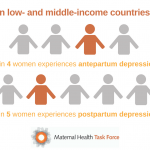A recent systematic review found that one in four women in low- and middle-income countries suffered from prenatal depression, and roughly one in five suffered from postpartum depression. Additional efforts are needed to identify risk factors and develop culturally appropriate interventions to ensure that all women experiencing perinatal mental health issues are properly screened, diagnosed and treated…read more
World Mental Health Day: Addressing Perinatal Depression in Low- and Middle-Income Countries
Posted onWomen in low- and middle-income countries are faced with a double burden: they are at greater risk of experiencing perinatal depression compared to women in high-income countries, and they are also less likely to get the care they need. Even in high-income countries, many women with antepartum or postnatal depression are not screened, diagnosed or treated. In low-resource settings, many women cannot access health facilities for antepartum, intrapartum or postnatal care at all, and those who do often receive poor quality care…read more
Research Gaps in Perinatal Mental Health: U.S. Racial & Ethnic Disparities and Neglected Global Populations
Posted onGiven that perinatal mental disorders are one of the most common complications of childbirth and affect such a large proportion of women in the U.S. and around the world, additional research efforts are warranted. Evidence suggests that certain women, both in the U.S. and globally, are at a disproportionately high risk of suffering from perinatal mental disorders, but the current body of research is insufficient for accurately identifying the most vulnerable women. Sound measurement and research is a necessary first step for identifying high-risk populations and designing evidence-based interventions to address inequalities in perinatal mental health…read more
Engaging Women with Mental Health Conditions in Health Care
Posted onHow to Close the Mental Health Gap in Low- and Middle-Income Countries
Posted onStrategies for Reducing and Treating Maternal Mental Health Disorders
Posted onIn South Africa, 47% of pregnant women and 34% of women after birth in low-income settings experience maternal depression. Despite the high prevalence, there is no state-provided programmatic response. Resolved to develop a meaningful response to this hidden crisis, a small group of midwives, volunteer counsellors and a medical doctor envisioned integrating mental health care for mothers at all points of entry in public sector services. The program they implemented was a success and has impacted thousands of lives… read more
Someone Like Us: Involving Peer Workers in the Treatment for Maternal Depression in Goa, India
Posted onThis blog post starts in Goa. Not at the white beaches, but in the antenatal clinic at Asilo hospital in Mapusa where women in all stages of pregnancy are queuing up for antenatal check-ups. It is one of the busy days at the hospital, with women sometimes needing to stand for hours before they are seen by a doctor. At least 15% of women in this queue suffer from perinatal depression and this figure can increase to up to 30% after the baby has been born – this is what we know from our research. In a country like India, where human resources are low, health-systems ill-equipped and mental disorders heavily stigmatized, these women will always be silent sufferers and will only in rare cases get the help and care they need to overcome their condition… read more
Three Approaches to Improving Maternal Mental Health From a Low-Resource Setting
Posted onThe majority of developing countries have a high prevalence of maternal depression ranging from18-25%. Countries with a high prevalence of maternal depression need a universal approach to maternal psychosocial well-being during pregnancy and in the postnatal period. A universal approach means that all women in the perinatal period should receive an intervention on maternal psychosocial well-being, which is integrated into MNCH programs and is simple enough to be delivered by community health workers so as to prevent psychosocial morbidity… read more
Community-Based Interventions to Improve Maternal Mental Health in Resource-Constrained Countries
Posted onRecognition that pregnant and postpartum women living in resource-constrained low- and lower-middle income countries can experience mental health problems is growing. However, a double disparity remains. First, prevalence of mental health problems among women in resource-constrained countries is much higher than it is among women living in well-resourced countries, with the greatest burden among the poorest women with the least access to services. Second, while all high-income nations have substantial research evidence about the nature, prevalence and risks for perinatal common mental disorders, few resource-constrained countries have any evidence at all… read more
Stigma and the Language of Mental Health in Mothers
Posted onHow do we talk about mental illness in pregnancy? Well, we don’t. Not that we don’t know about it at all; pregnancy-related mental illness, for the most part, is well-recognised culturally. But it’s not what mothers talk about while they work and watch their children play. Together with their partners (where partners are supportive), new mothers struggle to come to terms with symptoms they themselves can barely articulate. Both the women and their partners feel alone, while unknown to them, similar experiences within their own circle of friends and family members might well abound… read more


